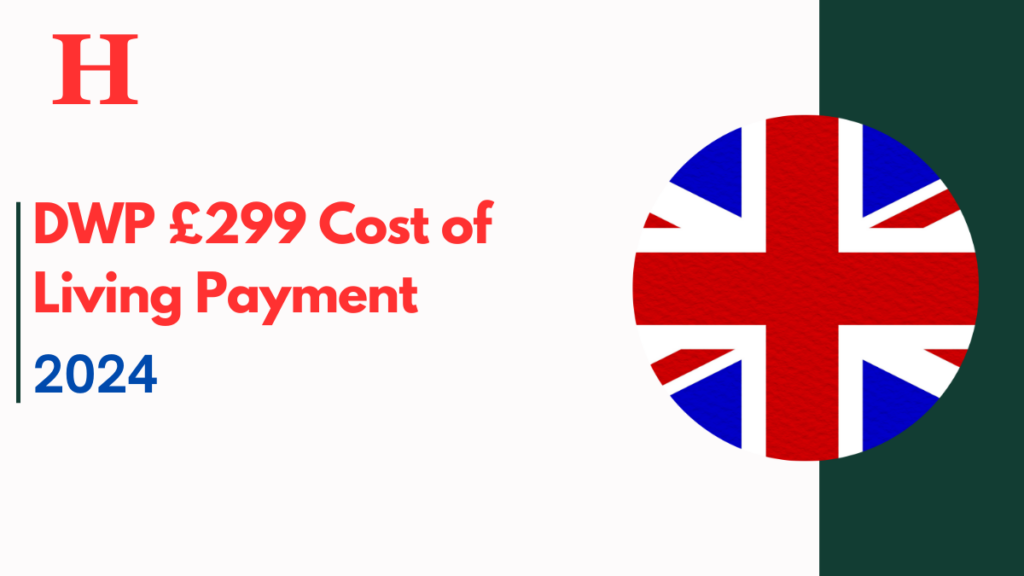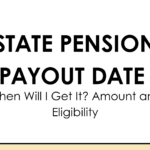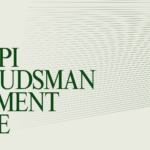In 2024, the Department for Work and Pensions (DWP) took significant steps to offer financial assistance to millions of UK households struggling with the ever-increasing cost of living. The final part of this initiative was the £299 cost-of-living payment, which aimed to provide relief to the most vulnerable groups affected by rising prices.
If you haven’t received this payment yet, or you’re unsure about your eligibility, don’t worry. This guide will walk you through everything you need to know, from eligibility requirements to the steps you should take if your payment hasn’t arrived.

DWP £299 Cost of Living Payment Received or Not?
The UK has seen a significant surge in living costs over recent years, with inflation affecting everyday expenses such as groceries, utilities, housing, and transportation. This has hit low-income families, pensioners, and individuals relying on government benefits the hardest. Recognizing this, the government decided to introduce a series of financial support payments to help ease the burden.
The overall package amounted to £1,350, distributed in different installments over 2023 and 2024, targeting around 8 million households to provide much-needed relief. The idea was to help those most impacted by inflation maintain their standard of living.
Breaking Down the Financial Support Payments
The total financial aid package of £1,350 was divided into three separate payments to ensure continuous support throughout the year. Here’s a breakdown of how and when these payments were made:
| Payment Amount | Payment Dates | Purpose |
|---|---|---|
| £301 | 25 April – 17 May 2023 | Initial support for rising living costs |
| £300 | 31 October – 19 November 2023 | Additional aid as inflation continued to rise |
| £299 | 6 February – 22 February 2024 | Final installment to help with ongoing financial strain |
Who Qualified for These Payments?
- Eligibility: The payments were automatic for people already receiving means-tested benefits, such as:
- Universal Credit
- Pension Credit
- Income Support
- Jobseeker’s Allowance (JSA)
- Employment and Support Allowance (ESA)
Good to Know: There was no need to apply for these payments if you were eligible—the funds were directly transferred to your registered bank account. However, if you haven’t received your payment yet, keep reading to find out what you can do.
What Was the £299 Cost-of-Living Payment All About?
The £299 payment was part of a wider strategy by the government to help people weather the storm of increased living costs. This payment was the third and final installment of a £900 cost-of-living scheme that the government introduced over 2023 and 2024.
The Goal
- Alleviate Financial Strain: Support households struggling to cover essentials like food, rent, utilities, and transportation.
- Target Vulnerable Groups: Prioritize individuals already receiving benefits or tax credits, as they were most susceptible to economic pressures.
Why It Matters: The DWP took steps to ensure timely payments, but unforeseen technical or administrative issues meant that some recipients faced delays or missed payments.
Haven’t Received Your £299 Payment? Here’s How to Check
If you were expecting the payment but haven’t seen it in your bank account, don’t worry. There are several steps you can take to confirm your status and resolve the issue. Let’s break this down into simple steps:
- Check Your Eligibility:
- Confirm that you were receiving a qualifying benefit during the eligibility period.
- Common qualifying benefits include Universal Credit, Pension Credit, and other means-tested benefits.
- Review Your Bank Statements:
- Look through your bank statements from February 2024 onwards. The payment should have been deposited into the same account you use to receive your regular benefits.
- Sometimes, payments might be delayed or missed, so it’s worth double-checking.
- Understand Potential Delays:
- Although payments were scheduled for 6 February to 22 February 2024, there might have been delays due to administrative or technical issues.
- Ensure you have allowed some extra time before assuming your payment is missing.
Steps to Take If You Haven’t Received Your £299 Payment
If you’ve gone through the steps above and still haven’t received your payment, it’s time to take action. Here’s a step-by-step guide on what you should do next:
1. Report the Missing Payment Online
- Visit the Official UK Government Website: The quickest way to report a missing payment is through the government’s dedicated online portal for cost-of-living payments.
- Information You’ll Need:
- Your full name
- Date of birth
- National Insurance (NI) number
- Your address and other identification details
2. Contact the DWP Directly
- Reach Out via the DWP Helpline: You can call the DWP helpline to speak directly with an advisor who can check your payment status.
- Have Your Details Ready: Make sure to have your NI number and relevant information at hand to speed up the process.
3. Await a Response
- The DWP usually takes around two weeks to investigate missing payments and get back to you. Be patient, but don’t hesitate to follow up if you haven’t received a response within this timeframe.
Reminder: You only need to report your missing payment once, either online or via phone. The DWP will handle the rest and reach out with any updates.
Other Financial Assistance Options Available
While the £299 payment was the final installment of this particular cost-of-living support scheme, there are still other forms of financial assistance available if you need help managing rising expenses.
1. The Household Support Fund
- Purpose: This fund has been extended into 2024 and is designed to help residents struggling with essential costs like food, utilities, and clothing.
- How to Access: Visit your local council’s website to see if you qualify and how to apply for assistance.
2. Local Council Assistance Programs
- Some councils offer one-off payments up to £140 to help cover essential bills, such as energy costs.
- Check your council’s online resources to find out about available programs.
3. Discretionary Housing Payments
- If you’re struggling to cover your rent, you might be eligible for Discretionary Housing Payments.
- These payments are intended to help those receiving Housing Benefit or the housing element of Universal Credit.
| Financial Support Program | What It Provides | How to Apply |
|---|---|---|
| Household Support Fund | Cash aid and bill assistance for essentials | Through your local council’s website |
| Council Assistance Programs | One-off payments for energy and utility bills | Contact your local council |
| Discretionary Housing Payments | Help with housing costs | Apply via your local council’s housing team |
Final Thoughts: Take Control of Your Financial Situation
The rising cost of living continues to challenge many households across the UK, but there is help available. If you haven’t received your £299 payment, take action now by following the steps outlined in this guide. And remember, there are other support options to explore, so don’t hesitate to reach out for additional assistance.
Stay informed, stay proactive, and make sure you access all the help available to navigate these challenging times.
Click here to know more

Sailza is a passionate writer known for her commitment to originality and quality. She crafts engaging, plagiarism-free content that captivates and informs. With a talent for storytelling and attention to detail, her work reflects her dedication to delivering insightful, creative, and authentic writing.



